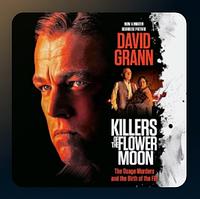You need to sign in or sign up before continuing.
Take a photo of a barcode or cover
David Grann is an investigative journalist at heart, so this book read like an article he would have published had it been shorter. It is beautifully written.
“But this time one night had passed, and then another, and Anna had not shown up on Mollie’s front stoop as she usually did, with her long black hair slightly frayed and her dark eyes shining like glass. When Anna came inside, she liked to slip off her shoes, and Mollie missed the comforting sound of her moving, unhurried, through the house. Instead, there was a silence as still as the plains.”
The story centers around the Osage murders and its involvement in the creation of the FBI. This part I didn’t really care much about, but I understood that it was needed to introduce the lead investigator of the Osage Murders, although…most of the murders went unsolved once the “big bad” was capture and sentenced. It was as if the government decided “alright, we did our job here” when they really didn’t. I appreciated the ending where David went back and tried to resolve some of the strings that were left untied.
My heart breaks for Mollie whose entire family was targeted in order to gain her headrights. But most of all I wonder what it was like sitting in that court room listening to how your husband tried to kill not only you but your children. Her mother and younger sister were poisoned. Another sister was brutally murdered. Another sister and her husband were killed in an explosion that Mollie’s husband designed for her and the children to be killed in as well. Luckily enough, Mollie’s youngest son fell ill and saved their lives.
What I wanted from this book was to learn more about the Osage, not just their tragedies. I wanted to learn how exactly this oil changed them. I wanted to know how having their land taken from them and being shuffled around changed them. I wanted to learn about their stories, their customs…but this isn’t the book for that. I plan to check out some other books either written by someone in the community or someone that dives in a little more.
“But this time one night had passed, and then another, and Anna had not shown up on Mollie’s front stoop as she usually did, with her long black hair slightly frayed and her dark eyes shining like glass. When Anna came inside, she liked to slip off her shoes, and Mollie missed the comforting sound of her moving, unhurried, through the house. Instead, there was a silence as still as the plains.”
The story centers around the Osage murders and its involvement in the creation of the FBI. This part I didn’t really care much about, but I understood that it was needed to introduce the lead investigator of the Osage Murders, although…most of the murders went unsolved once the “big bad” was capture and sentenced. It was as if the government decided “alright, we did our job here” when they really didn’t. I appreciated the ending where David went back and tried to resolve some of the strings that were left untied.
My heart breaks for Mollie whose entire family was targeted in order to gain her headrights. But most of all I wonder what it was like sitting in that court room listening to how your husband tried to kill not only you but your children. Her mother and younger sister were poisoned. Another sister was brutally murdered. Another sister and her husband were killed in an explosion that Mollie’s husband designed for her and the children to be killed in as well. Luckily enough, Mollie’s youngest son fell ill and saved their lives.
What I wanted from this book was to learn more about the Osage, not just their tragedies. I wanted to learn how exactly this oil changed them. I wanted to know how having their land taken from them and being shuffled around changed them. I wanted to learn about their stories, their customs…but this isn’t the book for that. I plan to check out some other books either written by someone in the community or someone that dives in a little more.
I read Killers of the Flower Moon after reading David Grann's previous book, The Wager. I liked this nonfiction book and gave it 4 stars. Published in 2017, this book investigates the systematic murder of wealthy members of the Osage Nation in Oklahoma during the 1920s—a crime spree that became known as the Osage Reign of Terror. At the time, the Osage were among the richest people per capita in the world due to oil rights on their land. Their wealth made them targets. When Osage people began dying under mysterious and violent circumstances, the case eventually caught the attention of the fledgling Federal Bureau of Investigation, which was then led by a young J. Edgar Hoover. This was Birth of Modern Law Enforcement: The case helped shape the FBI into a more professional organization.
Really interesting story! The only reason I’m giving it a lower star rating is because my brain could not focus while reading this. Although the story was really interesting and an important piece of history I just didn’t get latched into it. Perhaps I should stick to reading fiction for my little pea brain
dark
mysterious
sad
medium-paced
challenging
dark
emotional
informative
medium-paced
dark
informative
mysterious
medium-paced
An interesting, and compelling, history of the conspiracy around the murders of the Osage people in the early 1900s, and the eventual involvement of what was to become the FBI in investigating these murders. The events described in the book are shocking, but not really surprising when you consider how much oil the Osage people where sitting on. The book also reveals the rather depressing manner in which the USA government and society treated the tribal people. The writing style is engaging and the mystery unfolds apace.
LOVED THIS! It was so interesting and a great inisight into American history.
challenging
dark
sad
slow-paced
A very interesting book about how white people could not deal with the fact that a tribe of Indians was getting rich. Everyone including state and nation governments seemed to conspire to deprive the tribe members of their ability to enjoy their oil wealth. Then, locals who had been set up as guardians for tribe members since they "were not competent to handle their money" hatched schemes to kill off tribe members in order to inherit or steal their money. This happened in Oklahoma in the 1920s, the state that gave us the Tulsa massacre. Solving just one or two of the murders seemed to be instrumental in securing Hoover's FBI as a premier law enforcement agency.
The topic was very interesting. The writing was just so-so.
The topic was very interesting. The writing was just so-so.




